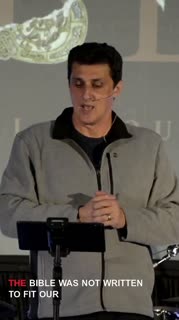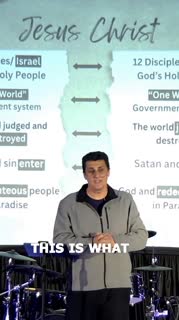Understanding the Bible: A Journey Through Covenants
Devotional
Sermon Summary
Bible Study Guide
Sermon Clips
1) "We will try to present it to you in a way that will help you realize that the Bible, the Word of God, it's life-giving. It's lifting you up and brings hope when it's done right. To get the best out of the Word of God, you should be studying when you have some specific time. Like when the kids are running through the house, probably that's not the perfect time to study the Bible. Or when you are in a fight with your spouse, hopefully not too often, that's not the time to study the Bible. So you have to find the perfect time that you can set aside, where you are going to learn more from the Word of God." [03:33] (46 seconds)
2) "The Bible was not written to fit our lifestyle. Our lifestyle should fit the Bible. Let me say it again. The Bible was not written to fit our lifestyle. Our lifestyles should fit the Bible. And why all of this teaching, rebuking, correcting, and training? Training. Because the next verse, Apostle Paul is saying, so that the servant of God, that means you and I, may be thoroughly equipped for every good work. For your relations with others, for your marriage, for your business, for your finances, for everything that you do, for every good work. It's useful to each one of us. The Bible is God's autobiography. It is God's redemption plan of mankind." [14:12] (65 seconds)
3) "The Old Testament tells a story about a people, about Israel. The New Testament tells a story about a person, and that is Jesus Christ. Which, by the way, Kelly will talk about this next week when we are going to talk about the Gospels and Jesus. The Old Testament centers around Abraham and Moses. The New Testament centers around Jesus and the Holy Spirit. Jesus is taking care of it all, and now we have the Holy Spirit inside of us to empower us to live it out. The Old Testament gathers around Mount Sinai. That was last. That was given. The New Testament gathers around the cross because that's where the covenant was fulfilled." [18:46] (63 seconds)
4) "The Old Testament writes a law on tablets. It's out. It's external on tablets. It's a rule of book. It's a rule book that has to be followed. The New Testament writes the law on our hearts. It's internally. It's on us. It's in us. The first one, you have to do it. The second one, you have to do it. The third one, you want to do it because it's in you. It's who you become. So, the question is, do we still read Old Testament then? Of course, we do. Jesus said this in Matthew 5, verse 17." [20:28] (50 seconds)
5) "God allows for the whole Old Testament to happen to show us that we cannot do it through our own. To our own strength, to our own works. We cannot work our way in heaven, to heaven. Now, something else that is very interesting is that in the Old Testament, we have around 400 times predictions or prophecies about Jesus, about this new covenant. One time, one for all. And all 400 prophecies actually were fulfilled through the letter, through Jesus Christ." [33:52] (52 seconds)
6) "Let me say it this way. If you see the relationship with God and the redemption plan through the Old Testament eyes, you know that saying or the verse that's saying, if you love me, you will keep my commands. So if you see it through the Old Testament, that means if you love me, you will prove me and keep my commands. If that's the Old Testament. If you see the same verse through the New Testament eyes, if you love me, you will obey my command. You'll obey my commands. Don't worry about it. If you love me, if you have me in your heart, in your mind, no problem. You will obey my commands because it's inside." [37:21] (54 seconds)
7) "This is what the whole Bible is all about. It's starting with God and righteous people in Garden of Eden with his desire to have a relation with his humankind, with his creation. And it's going to end with us being with Jesus in paradise again. And through the whole process, it's just showing us that we need to have a relationship with God. And we need to have a relationship with God. And we need to have a relationship with God. And we need to have a relationship with God. And we need to have a relationship with Jesus in our life. Jesus Christ, it's at the top. The Bible, the whole Bible, it's about the Savior. It's about Jesus Christ. It's about the relation that he wants to have with each one of us." [41:43] (39 seconds)
Ask a question about this sermon
2) "The Bible was not written to fit our lifestyle. Our lifestyle should fit the Bible. Let me say it again. The Bible was not written to fit our lifestyle. Our lifestyles should fit the Bible. And why all of this teaching, rebuking, correcting, and training? Training. Because the next verse, Apostle Paul is saying, so that the servant of God, that means you and I, may be thoroughly equipped for every good work. For your relations with others, for your marriage, for your business, for your finances, for everything that you do, for every good work. It's useful to each one of us. The Bible is God's autobiography. It is God's redemption plan of mankind." [14:12] (65 seconds)
3) "The Old Testament tells a story about a people, about Israel. The New Testament tells a story about a person, and that is Jesus Christ. Which, by the way, Kelly will talk about this next week when we are going to talk about the Gospels and Jesus. The Old Testament centers around Abraham and Moses. The New Testament centers around Jesus and the Holy Spirit. Jesus is taking care of it all, and now we have the Holy Spirit inside of us to empower us to live it out. The Old Testament gathers around Mount Sinai. That was last. That was given. The New Testament gathers around the cross because that's where the covenant was fulfilled." [18:46] (63 seconds)
4) "The Old Testament writes a law on tablets. It's out. It's external on tablets. It's a rule of book. It's a rule book that has to be followed. The New Testament writes the law on our hearts. It's internally. It's on us. It's in us. The first one, you have to do it. The second one, you have to do it. The third one, you want to do it because it's in you. It's who you become. So, the question is, do we still read Old Testament then? Of course, we do. Jesus said this in Matthew 5, verse 17." [20:28] (50 seconds)
5) "God allows for the whole Old Testament to happen to show us that we cannot do it through our own. To our own strength, to our own works. We cannot work our way in heaven, to heaven. Now, something else that is very interesting is that in the Old Testament, we have around 400 times predictions or prophecies about Jesus, about this new covenant. One time, one for all. And all 400 prophecies actually were fulfilled through the letter, through Jesus Christ." [33:52] (52 seconds)
6) "Let me say it this way. If you see the relationship with God and the redemption plan through the Old Testament eyes, you know that saying or the verse that's saying, if you love me, you will keep my commands. So if you see it through the Old Testament, that means if you love me, you will prove me and keep my commands. If that's the Old Testament. If you see the same verse through the New Testament eyes, if you love me, you will obey my command. You'll obey my commands. Don't worry about it. If you love me, if you have me in your heart, in your mind, no problem. You will obey my commands because it's inside." [37:21] (54 seconds)
7) "This is what the whole Bible is all about. It's starting with God and righteous people in Garden of Eden with his desire to have a relation with his humankind, with his creation. And it's going to end with us being with Jesus in paradise again. And through the whole process, it's just showing us that we need to have a relationship with God. And we need to have a relationship with God. And we need to have a relationship with God. And we need to have a relationship with God. And we need to have a relationship with Jesus in our life. Jesus Christ, it's at the top. The Bible, the whole Bible, it's about the Savior. It's about Jesus Christ. It's about the relation that he wants to have with each one of us." [41:43] (39 seconds)







